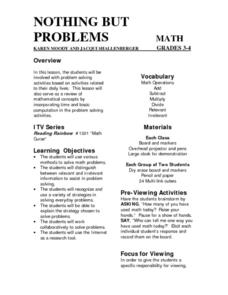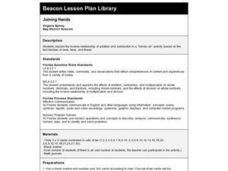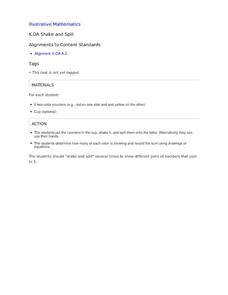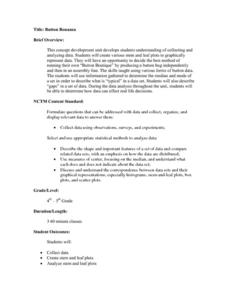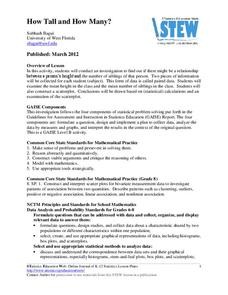Berkshire Museum
Reduce, Reuse, and Recycle: Sorting Through Personal Choices
Raise children's awareness about the importance of conservation with this hands-on science lesson. Start by breaking the class into groups and having them collect trash from around the school or local park. Students then use the provided...
National Security Agency
Classifying Triangles
Building on young mathematicians' prior knowledge of three-sided shapes, this lesson series explores the defining characteristics of different types of triangles. Starting with a shared reading of the children's book The Greedy...
EngageNY
TASC Transition Curriculum: Workshop 15
What do a cheetah, Audi commercial, and air have in common? They're all topics of an engaging inquiry-based, hands-on workshop for educators about background knowledge, reading strategies, the CER model, and argumentative writing. The...
Curated OER
Nothing But Problems
Here is a fabulous lesson on problem solving in the mathematical world. In it, third and fourth graders get lots of great coaching on how to approach word problems, and how to best find a solution. They watch an episode of Reading...
Baylor College
What Makes Water Special?
Get close up and personal with a drop of water to discover how the polarity of its molecules affect its behavior. Elementary hydrologists split and combine water droplets, and also compare them to drops of oil. Much neater than placing a...
Baylor College
What Is a One Part Per Million Solution?
Water may appear to be crystal clear, but there could be dissolved substances present. Lab groups make a one-part-per-million of a food coloring solution to demonstrate this concept. As part of an outstanding unit about water, this...
Curated OER
Story Problems - Math
Students participate in hands-on, computer activities to demonstrate the addition and subtraction of mathematical situations. Given a story problem, students determine when to add or subtract. Using word processing technology, students...
Curated OER
Plants and Animals, Partners in Pollination
Students participate in multiple hands-on activities to explore reproduction and pollination. In groups, using a cotton swab and powder, students simulate being pollinators and plants. They name the parts of the flowers and the function...
Curated OER
Joining Hands
Second graders explore the inverse relationship of addition and subtraction in a "hands-on" activity based on the fact families of ones, twos and threes.
Curated OER
Introduction to Measuring Length in Customary Units
Students explore customary units of measurement. Students use yardsticks, rulers, and adding machine paper to measure specific units as directed by the teacher. Through completing this hands-on activity, they actively investigate units...
Curated OER
Math: Divide and Conquer - Equivalent Fractions
Students engage in hands-on activities and observe videos to develop fraction skills. In one activity, they create "paper pizzas" complete with original toppings. By swapping pieces, students display whole and unique-looking pizzas.
Curated OER
Ladybug Math
Students count the number of spots on ladybug wings. They add to find total number of spots on ladybug cut outs and complete the associated worksheet. They write ladybug addition story problems.
Curated OER
Binaural Hearing in Humans
In this creative science activity from Scientific American, students learn more about hearing with two ears and make a hands-on exploration of how sound is located. Excellent web link resources are also provided.
Curated OER
Goldfish Addition and Subtraction
Engage in a hands-on addition and subtraction activity that is a wonderful tie-in with ocean studies. As the teacher, you will make up equations using construction paper and goldfish crackers.
Illustrative Mathematics
Shake and Spill
Entertaining as well as educational, this math activity about decomposing numbers is bound to capture the engagement of young learners. Given a cup and five two-color counters, young mathematicians simply shake and spill the cup,...
Curated OER
Our Solar System - Comparing Planetary Travel Distances
NASA presents a mini-unit on distances in our solar system. It incorporates scientific concepts of gravity, mass, density, and payload while your aspiring astronauts also employ mathematics skills. They calculate speed, they determine...
Curated OER
Mining Shapes
In this 2-D shapes lesson, kindergarteners review plane shapes attributes. They engage in a shape hunt in the classroom and create art using plane shapes. A good, hands-on lesson!
Illustrative Mathematics
Size Shuffle
In the eyes of children the world is a simple place, objects are either big or small. This simple activity aims to expand the comparison language of young mathematicians as they use the words taller and shorter to compare their...
Space Awareness
History of the Universe
Your pupils may believe that you and their parents are the oldest things in the universe, but surprise! There are elements of the universe that are even older. Elementary scientists create a class timeline to demonstrate the...
Illustrative Mathematics
3-D Shape Sort
From the apple on your desk and the coffee cup in your hand, to the cabinets along the classroom wall, basic three-dimensional shapes are found everywhere in the world around us. Introduce young mathematicians to the these common figures...
Curated OER
Button Bonanza
Collections of data represented in stem and leaf plots are organized by young statisticians as they embark some math engaging activities.
EngageNY
Definition of Translation and Three Basic Properties
Uncover the properties of translations through this exploratory instructional activity. Learners apply vectors to describe and verify transformations in the second installment of a series of 18. It provides multiple opportunities to...
American Statistical Association
How Tall and How Many?
Is there a relationship between height and the number of siblings? Classmates collect data on their heights and numbers of brothers and sisters. They apply statistical methods to determine if such a relationship exists.
Curated OER
Comparing and Ordering Fractions, Mixed Numbers, and Decimals
Create your own fraction kits by folding and labeling paper using fraction vocabulary. Learners then work in groups to use these in comparing and sequencing both whole numbers and fractions. They also create unit cubes and develop an...



